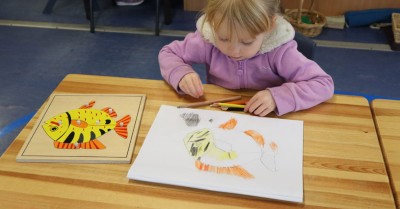The capacity to work on a task with sustained attention is an extremely important developmental milestone for children. It not only helps them to learn better in school but is directly related to positive life outcomes in adulthood through higher self-esteem and self-efficacy. The following article provides strategies for improving concentration in children.
Set Reasonable Limits
Children between the ages of four and five can usually concentrate on a task for five to twenty minutes. But the time may reduce with increasing difficulty of the task. So when introducing new or planning difficult tasks for young children, set a realistic time limit. Ideally, though design tasks that are intrinsically enjoyable to the children so that they can concentrate better.
Focus On One
Though multitasking is feted as a characteristic skill of high achievers in popular culture, research proves that it hampers concentration. So in the classroom, have children do one thing at a time like just singing the alphabet together as they look at the letters instead of tracing them with fingers too.
Make Time For Practice
Concentration is like a muscle that can be strengthened with practice. Help children with age-appropriate exercises or adapt well-proven exercises to build concentration. For example, young children can be taught the basics of the STOP technique to increase mindfulness which is all about focusing on the here and now. This involves
- stopping whatever they are doing
- taking a deep, slow breaths to ease tension in the body
- observing or just noticing whatever is happening around or in the body
- proceeding with whatever you were doing, after having anchored themselves, however briefly, to the present
Consider Room Design
Avoid cluttering up walls with artwork, posters and charts. Chaotic displays and overly bright colours might not just be exhausting for oversensitive children but generally distracting as well. Instead, use aesthetic arrangements for alphabets and number charts or use learning frameworks to decide what goes up on the wall display.
Plan The day
See that there are adequate planned breaks included in the school day. This will allow children to rest and recharge with a snack or a romp in the playground. Also alternate high-concentration activities like building models or reading tasks with those that require children to use other skills like socializing as in pretend play.
Help Children Manage Anxiety
When children are anxious, they find it difficult to concentrate. Teach them anxiety-relieving techniques like belly breathing by slowly inhaling through the nose and exhaling through the mouth. The practice can be accompanied by raising and lowering of hands as well. As the heart rate steadies and anxiety eases, children will feel much calmer and capable of approaching tasks with concentration.
Yet another way to make challenging tasks more manageable is to break them into smaller parts so that a child can focus on each with better results. For example when learning to tie shoelaces, let the child start by practising the initial knot before moving on to making the two loops and then tying them together. All such measures will go a long way to help children address tasks and goals with sustained focus and attention.
Further Reading
Importance Of Puzzles In Early Childhood - The following article provides information on the benefits of puzzles for children.
Benefits Of Yoga For Children - The following article provides information on What Is Yoga, the Benefits Of Yoga, Teaching Children Yoga and more.
Sensory Processing Activities For Children To Increase Attention - The following article provides strategies and activity ideas for auditory, visual, tactile, oral, and movement sensory stimulation.
References:
Helping Children Focus and Concentrate, PBS







 As an Educator in Australia, your pay rate falls under the Children’s Services Award 2010. This award states the minimum amount that an employer can
As an Educator in Australia, your pay rate falls under the Children’s Services Award 2010. This award states the minimum amount that an employer can When working as a qualified Early Childhood Teacher (with a university degree) within a service, your rate of pay will come from the Educational Services
When working as a qualified Early Childhood Teacher (with a university degree) within a service, your rate of pay will come from the Educational Services When working as a Diploma Qualified Educator your pay rate is from the Children's Services Award 2010. This Award states your minimum rate of pay
When working as a Diploma Qualified Educator your pay rate is from the Children's Services Award 2010. This Award states your minimum rate of pay When working as a Cert 3 Qualified Educator, your pay rate is from the Children's Services Award 2010. This Award states your minimum rate of
When working as a Cert 3 Qualified Educator, your pay rate is from the Children's Services Award 2010. This Award states your minimum rate of Educational Leaders play a crucial role in their early childhood service by ensuring that the educational program aligns with best practices and supports the holistic
Educational Leaders play a crucial role in their early childhood service by ensuring that the educational program aligns with best practices and supports the holistic In early childhood education and care, ratios are more than a technicality—they are a frontline safeguard. Every child deserves responsive supervision, emotional connection, and developmental
In early childhood education and care, ratios are more than a technicality—they are a frontline safeguard. Every child deserves responsive supervision, emotional connection, and developmental With the new national child safety reforms kicking in on 1 September 2025, early childhood services like yours have a real opportunity to lead the
With the new national child safety reforms kicking in on 1 September 2025, early childhood services like yours have a real opportunity to lead the Here’s a comprehensive Mobile Phone and Smart Watch Policy tailored for early childhood education and care (ECEC) services in Australia, aligned with the latest 2025
Here’s a comprehensive Mobile Phone and Smart Watch Policy tailored for early childhood education and care (ECEC) services in Australia, aligned with the latest 2025 The Sea of Fish Challenge is a national initiative that invites children, educators, families, and communities to create and display fish artworks as a symbol
The Sea of Fish Challenge is a national initiative that invites children, educators, families, and communities to create and display fish artworks as a symbol Across the early childhood education and care sector, educators are sounding the alarm: current staffing ratios are insufficient to deliver safe, meaningful, and developmentally appropriate
Across the early childhood education and care sector, educators are sounding the alarm: current staffing ratios are insufficient to deliver safe, meaningful, and developmentally appropriate


